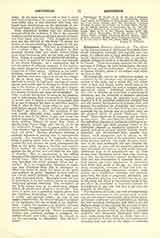

Abstinence, PHYSICAL EFFECTS OF.—The effects on the human system of abstinence from flesh meats divide themselves naturally and logically into two parts: (I) Effects due to total abstinence (in other words vegetarianism); (2) Effects due to partial or periodic abstinence, such as is enjoined by the Catholic Church. These abstinences comprise the fish observance of Fridays, the fasts before feasts, the forty days of Lent, and the ember-days. It is the partial, or Roman Catholic, phase of the subject with which we have to deal.
Physiologically, man is an omnivorous animal, as evidenced by the structure and consequent nomenclature of the teeth; and a mixed diet, into which meat or flesh food largely enters, would seem to be the natural requirement for such a complex physio-anatomical entity. Additional corroboration of this view is afforded by researches of physiological chemistry, and the discovery of elements produced at various points along the digestive tract, whose function it is to peptonize milk-foods, emulsify fats and oils, destroy the insulation of muscular fibre, and prepare the nucleines for absorption and nutrition. Granting, therefore, that flesh food in some form is necessary for the human race as a whole, what are the physical effects of partial Abstinence therefrom? These effects are as numerous and divergent as the causes. We have first, the family history of the individual (diseases or tendencies inherited or acquired); second, age; third, personal history of the individual (diseases or tendencies inherited or acquired), natural or artificial infantile feeding; fourth, education and environment; fifth, climatic conditions; sixth, occupation and its effects on the physical and mental state of the individual; seventh, status praesens, and last—but really the most important of all—that indefinable but very tangible element which we may call the personal equation in each individual, the observer as well as the observed. Additional facts to be remembered are: (a) That women bear Abstinence better than men, because, as a rule, the former have greater development of fatty and less development of muscular tissue; (b) that mature age bears deprivation of customary food better than youth or old age; (c) that a very damp atmosphere, extremes of heat and cold, unhygienic surroundings (tenements, prisons, workhouses, etc.), insufficient, improper, and unwholesome food, the state of pregnancy, alcoholism, and the premature physical and mental decadence, due to the stress and strain in the modern battle of life, are all to be considered as important matters for investigation in any case that has to do with the question of Abstinence.
The Church has so wisely, and with a foreknowledge of scientific investigation and present proof so accurate as to be almost supernatural, taken all the abovementioned conditions into consideration, in framing her laws regarding Abstinence, that there is not the slightest danger of any physical ills accruing to those to whom these laws apply. On the contrary, it is abundantly demonstrated by the highest scientific authority that temporary Abstinence from solid food—particularly flesh food, in which there is a great proportion of waste material, and consequently, increased wear and tear on the organs of excretion, such as the lungs, liver, and kidneys—is greatly to be desired in all persons, but particularly in those suffering from acute infections and inflammatory diseases. Those who lead a physically active life, like the manual laborer, seem to need animal food more continuously and feel its temporary withdrawal more acutely than the sedentary or brain worker.
Here, also, the important element is the personal equation. The history of mankind seems to show that while the meat-eating nations of the earth have been the most powerful, aggressive, and sanguinary (growing, in other words, like the things they feed on), yet they have been and continue to be conservative forces in civilization; prolific and enduring contributors to the arts and sciences, and, in the final analysis, strenuous upholders of civil and religious liberty and morality. The dietetic question raised by some as the result of the late Russo-Japanese War means nothing as a basis of comparison. It is a well-known fact that battles have been fought, and lost, and won, alike by men suffering from too much, too little, or no food at all. Wars and their eventualities depend, not so much on foods as on civil, religious, and Politico-economical conditions. The medical and scientific world of today seems to be well satisfied (I) That while man, by structure and development, is omnivorous, there is too much animal food consumed by the average individual, particularly in large centers of population. (2) That owing to this large consumption of food, which has an amount of waste out of proportion to its nutritive value, the vital organs are overtaxed in their excretory functions, and that consequently, human life and usefulness is very frequently curtailed. (3) That this overingestion of animal food is in some way—as yet undetermined—closely associated with the rapid increase of parasitic diseases like cancer. (4) That overfeeding—particularly with strong, meaty foods—together with lack of proper muscular exercise have much to do with the question of so-called “race-suicide”. This last suggestion arises from the well-known analogy between the reproductive processes in human and brute animals. Too much and too rich food combined with physical inactivity has a tendency to replace (by a process of degeneration) the muscular fibres of the reproductive organs by fat cells, and hence render such organs either sterile or incapable of carrying a pregnancy to term.
J.N. BUTLER

